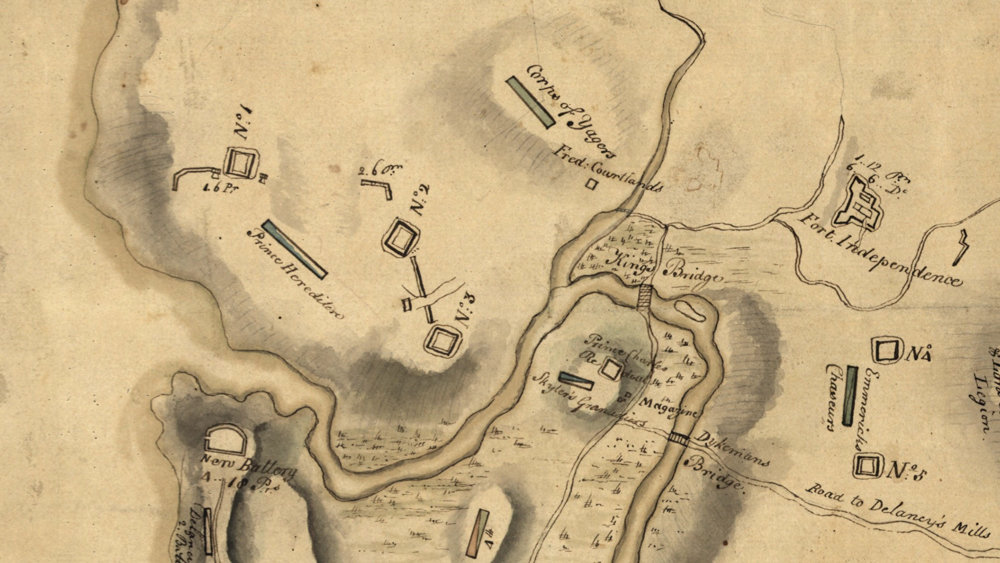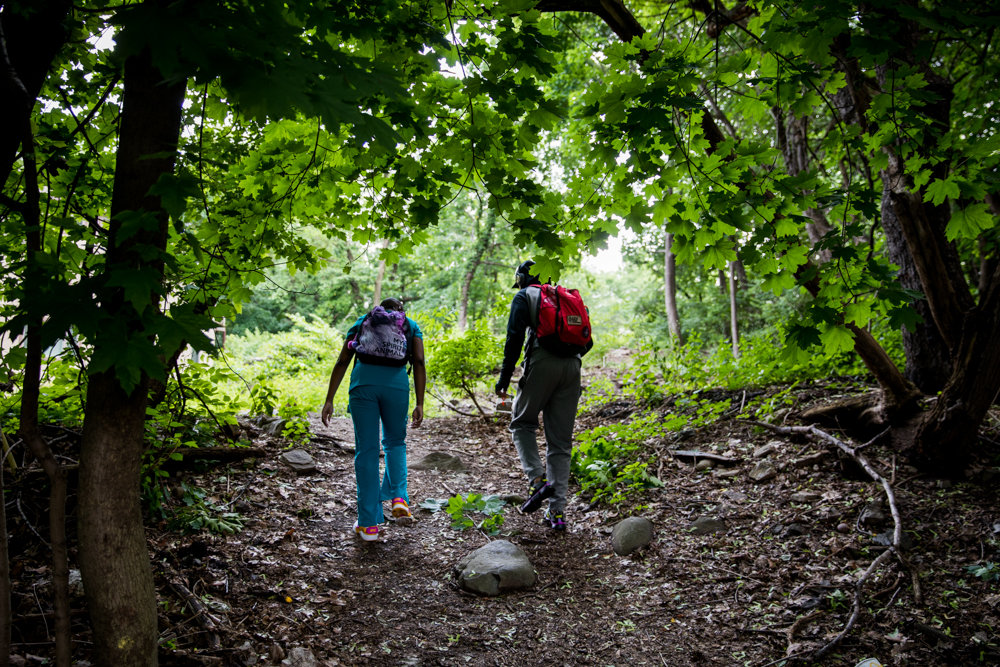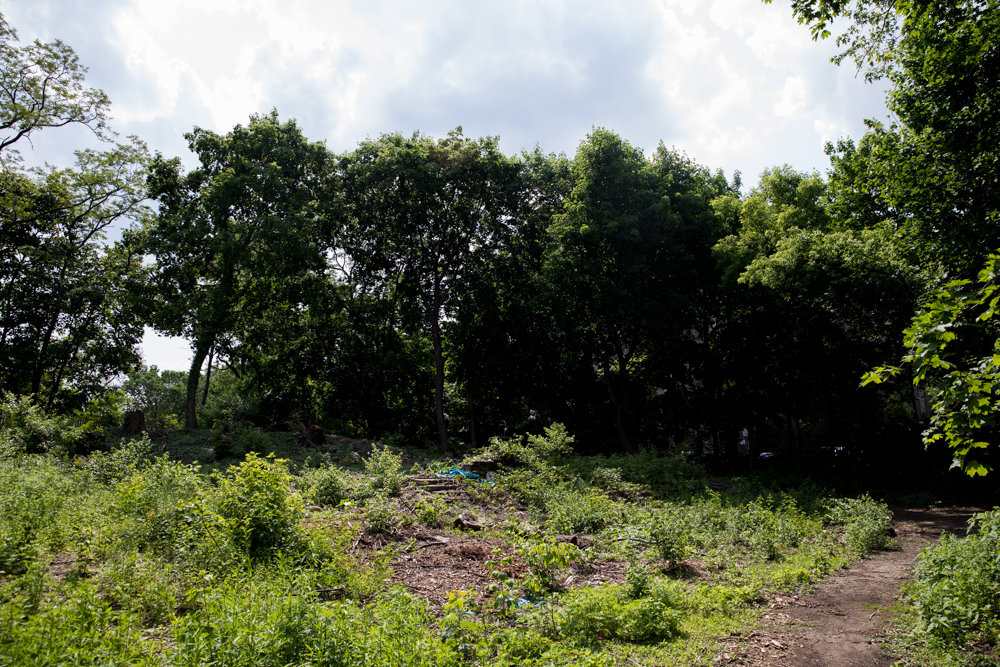Historians hope to find Revolutionary War artifacts at Spuyten Duyvil site
Ruins of a Revolutionary War history may be buried beneath the vacant lots on Fairfield Avenue at West 230th Street. But a disagreement over terms for the Kingsbridge Historical Society to perform an archeological dig on the site means what lies there could remain a mystery.
For decades, locals believed the land contained remains of the second of three forts George Washington ordered built on Spuyten Duyvil Hill to defend the King’s Bridge in 1776, according to the historical society’s website. Historians deduced the location of all three forts based on old documents and attempted early excavations. Reginald Pelham Bolton, who explored notable parts of northern Manhattan and the Bronx, wrote about digging out the foundation of the second fort in 1914 and finding artifacts he contended were from the Continental Army’s encampment there.
Sites of the other two forts were built upon over the years, but the supposed location of the second fort remained empty since a fire destroyed a tennis club built nearby in the 1960s. Over the past 30 years, professional archeologists have found promising evidence the fort’s foundations are buried there.
“It was always an intriguing spot to think about and to do research on,” historical society president Nick Dembowski said.
The land has been more of a dumping ground than a battleground over the years. But months ago, the land was cleared and construction appeared imminent on three custom homes. Dembowski reached out to the land’s owner, Martin Zelnik, and developer Hal Dorfman.
“I emailed the owner and said even if we dug around and found George Washington’s teeth, it wouldn’t stop their work,” Dembowski said.
No fight happened there and no soldiers are buried nearby, so the site really only has value to the immediate community, he said. The historical society only wants to solve the mystery of whether the fort’s ruins are there.
“In the sense of local history, it’s a treasure because there’s not anything like that really left in the city, because everything else has been built on,” Dembowski said. “And, according to my research, there’s never been a building put on top of the site of this fort. There was a tennis court, but no foundations were dug.”
Dorfman was initially dismissive of the historical society excavating the land, Dembowski said. But after including Zelnik on an email explaining the group’s intent — and promising they wouldn’t go public with their findings until after the houses were built —both sides began a friendly negotiation to make the dig happen.
Dorfman refused to comment.
Dembowski was somewhat dismayed, however, at the restrictions Dorfman and his attorney proposed. The historical society was given two weeks to organize a dig team and prepare for the excavation because construction was set to begin soon.
At first, Dembowski said they were allowed to dig one hole. But after some conversation, the developer agreed to five holes no larger than a couple square feet. The historical society needed a $2 million insurance policy covering everyone participating in the dig in order to protect Dorfman and Zelnik from liability.
But none of the restrictions they discussed were dealbreakers, Dembowski said. He met with Dorfman at the site May 24 to talk about spots they planned to dig starting the following Tuesday.
“It was very casual and very upbeat,” Dembowski said. “He said, ‘Of course we need to sign an agreement about this dig.’ And I was like, ‘Yeah, of course.’”
But when Dembowski got the agreement, it included restrictions he said they’d not talked about. Every person participating in the dig had to sign an agreement that barred them from ever discussing the excavation’s findings without getting Dorfman and Zelnik’s consent, even after construction was complete. Photography — which would contextualize the arrangement of any artifacts —also would be prohibited.
“They basically wanted to make sure that anything that we found or discovered, we would need their permission to talk about it,” Dembowski said. “Actually, their descendants would inherit the privilege of censoring our work in perpetuity.”
The society’s consulting archeologist, Allan Gilbert of Fordham University, says such an agreement would violate ethics, especially if significant artifacts were found.
Dembowski produced a reply email dated May 26 to Dorfman outlining why the historical society could not agree to those terms. The next day, Dorfman replied and said he had forwarded the concerns to Zelnik.
“Hope to have it to you by this afternoon,” Dorfman wrote.
It was the last thing Dembowski heard from either man. By Monday he called off the dig.
Friday, Zelnik told The Riverdale Press he never spoke to Dembowski directly and let Dorfman handle the agreement, but his impression was that Dembowski backed out of the agreement because of the restrictions.
“I’m not sure of the wording of the confidentiality part, but if he got back to us and said he’d like to do something, we could discuss it,” Zelnik said. “I don’t recall it being raised as an issue. All I know is that we got the certificate of insurance and we were ready.”
Zelnik says he has no problem with the historical society doing an excavation. For years, he’s maintained there is likely nothing on the site — only the remains of a tennis club that burned in the 1960s — but he didn’t mind local historians exploring.
“I thought (the agreement) was fine,” Zelnik said. “But the next thing I know, he’s going to the newspapers making claims that I’m totally unaware of.”
Even after talks stalled, Zelnik said he’d still consider allowing the dig to go on, provided the agreement was signed and all participants were covered by liability insurance.
“If it’s just a question of getting publicity or being able to photograph something for documentation, I don’t have a problem with that,” he said. “It was never raised with me. If they wanted a photograph an arrowhead if they found one, God bless them. I’m all for historic preservation.”
He suggested Dembowski put his concerns into writing, submit it to himself, Dorfman and the attorney, and he would consider the request.
Monday, Dembowski said he did just that over the weekend but received no response.
Zelnik, meanwhile, said nothing had changed since Friday and he was letting Dorfman handle the issue.











